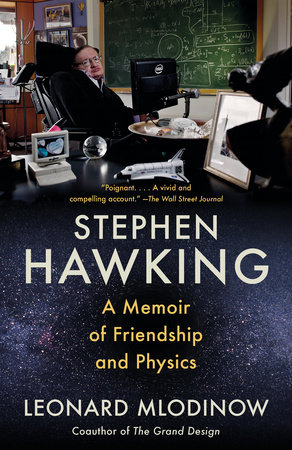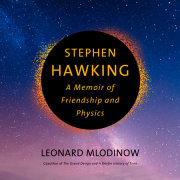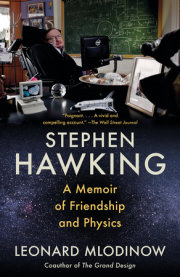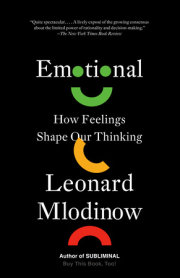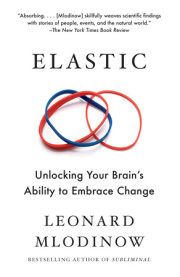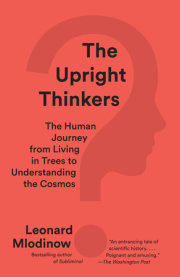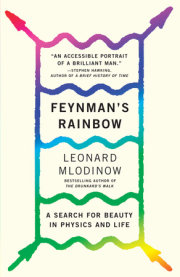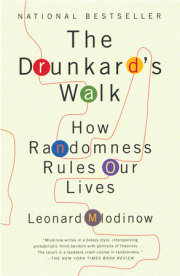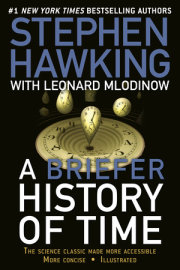Judith led me in. There was Stephen, sitting in his famous wheelchair, behind his famous desk. He was looking down toward his computer screen. His face appeared young for someone sixty-four. He wore a blue button-down shirt with the top button or two undone, exposing his stoma—the hole at the base of his neck through which he breathed. It looked like a dark red circle of blood the size of a dime. He was very thin, and his shirt and gray dress slacks were correspondingly baggy. The only muscles Stephen could move with regularity were those in his face. His other muscles had deteriorated, so there was a limpness to his body that affected his posture. His head sat unnaturally low between his shoulders as if it were sinking in, and it had a slight tilt. On television this was all part of his look, but viewed in person, it was disconcerting, and though I’d worked with him at Caltech, I wasn’t yet used to it. Still, he was an icon, and I felt a bit star-struck—who was I to merit all the time we were going to spend together, to merit him clearing his entire schedule for a week or more at a time to accommodate my visits?
“Hi, Stephen,” I said, though he hadn’t looked up. “Good to see you. And great to be here. I love Cambridge!”
He still didn’t look up. I waited a minute. It got awkward. Then, to fill the silence, I said, “I’m excited to start the book.”
As soon as I’d uttered the words, I regretted them. A dumb cliché, I thought, and in any case they didn’t fill a whole lot of the silence. Also, what I’d said wasn’t technically true. We’d put in some work already, on Stephen’s last couple of visits to Caltech. But all we’d done then was discuss what the book would entail. We hadn’t yet actually written anything.
I tried to think of something else to say. Something more intelligent. Nothing came to me. Finally, I noticed Stephen twitching his cheek. That was how he typed. His glasses had a sensor that detected the twitches and translated them to mouse clicks, which allowed him to select letters, words, or phrases from lists as the cursor moved around on his screen. It was sort of like playing a computer game. Since he was typing, I figured he was going to reply to my awkward babble. He was going to say something and let me off the hook. After a moment, his computerized voice finally spoke. But all he said was “Banana.”
This threw me off. I’d flown six thousand miles, and arrived a couple of days early just so I’d be fresh when I met him, and the only reaction I got was “banana”? What does it mean when you greet someone and he responds with the name of a fruit? I pondered this. But then Sandi, his carer, leapt up from the couch where she’d been sitting, reading a romance novel.
“Banana and kiwi?” she asked.
Stephen raised his eyebrows, meaning yes.
“And tea?”
He again signaled the affirmative.
As Sandi walked around to the mini kitchen behind him, he finally gazed up at me. We locked eyes. Strangely, now, he didn’t need to use his words. His expression was warm and happy, and it disarmed me. Now I felt guilty for being impatient with him. He started typing. After a minute or so, the words I had been waiting for finally came out. “Welcome to DAMTP,” his voice said.
I could tell there wouldn’t be a lot of small talk, and that was fine with me. I really
was excited to get to work. But just then a middle-aged man walked in. He was a Cambridge professor, a semi-well-known cosmologist. I recognized him, but I couldn’t think of his name. Nor was it offered, and of course Stephen didn’t expend the energy to introduce us. “I want to talk to you about Daniel,” he said to Stephen, ignoring me. “Do you have a minute?”
In the coming years, I would always find this annoying. People would pop in at random times and interrupt us in the middle of our work. “Just a quick minute,” they’d always say. But I soon learned that “quick” was a euphemism for “not quick.” Once in, Stephen’s colleagues usually spoke to him at length. Though the interruptions bothered me, Stephen didn’t seem to mind them at all.
Stephen raised his eyebrows, meaning yes, which meant I’d have to wait. The conversation was mildly interesting for a while. It seems a student named Daniel’s stipend had run out, and he hadn’t yet finished his Ph.D. But he’d been working diligently and made a good start. Could the department spring for more cash to support him till he got done? Stephen, as head of the general relativity group, was in charge of allocating certain grant monies to students and young postdocs for support, travel, and other needs.
After a few minutes my mind wandered. I looked around the room. The office was more or less a rectangle, with one of the longer sides the one with the door. The side opposite was lined with windows that provided a lot of light and a nice view of the futuristic complex.
Stephen’s desk was just to your left as you walked in, situated perpendicular to the windows. The couch was to the right, with its back pushed against them. Behind Stephen was the mini kitchen—a counter with a sink in it and an electric kettle—and a wall of bookshelves above. To the right and left of the door were blackboards covered with equations scrawled by his many students and collaborators. There was also a photoshopped picture of Stephen with Marilyn Monroe, about whom, in his younger days, he’d had a strange obsession.
The office was large for a university office, smaller only than that of the department head. I’d been in executive offices in the business world and in Hollywood, and you could tell, even before you entered, that these people were movers and shakers. But physics is not a money sport, and Stephen’s office was modest. If Stephen had been an executive of comparable fame in the corporate world, this office could’ve fit in his private bathroom.
They were finally winding down. Bottom line, the professor said, would Stephen approve £6,000 for the guy? Stephen typed his decision: “3,000.” The professor thanked him and left. Such issues, it turned out, were not uncommon, and Stephen always said yes to the requests because he had such empathy for his students. But he always halved the amount, not wanting to seem like a soft touch. It didn’t work. “He’s an absolute pushover,” Judith would tell me. “And they all know he halves the amount so they ask for double. It’s an odd game, really. Played by odd people. No disrespect intended.”
By the time the professor was done making his request, Sandi had long since peeled and mashed a banana and kiwi together, and made a pot of tea. I went to sit on the couch for the next ten minutes as she fed him with a tablespoon. The utensil was on the large side, the perfect size for spooning food into Stephen’s mouth. One of his carers had come across it in a local restaurant one day, jammed it into her purse, and stolen it. Now they used it at every meal.
The couch, the famous couch, was bright-orange leather and quite comfortable. I later found out that it was where Stephen was carried—by the carer on duty and Sam Blackburn, his computer/electronics assistant—when he needed, with the carer’s help, to relieve himself. That explained the meaning of
on the couch. It also made me feel a bit odd when I sat there.
For Stephen, being on the couch took some time. Afterward he might seem tired out, and he’d often follow up with tea, a mashed banana, or both—as he’d just done. When he was on the couch, I would learn, was pretty much the only time Stephen’s door would be closed.
I wondered what it was like for Stephen to always be in the presence of a carer in such an intimate situation. I wondered what it was like to
need others in that situation. To open yourself up to their help, as he had to. I looked over and he was almost finished. Bits of banana and a stream of tea dribbled from his mouth and down his chin. Sandi wiped them with a napkin. To accept that kind of assistance was a bridge he’d crossed many years earlier, and there was no hint that he felt sorry for himself. Instead, he seemed to feel fortunate that he had the people he needed to help him.
We physicists study how systems change in time, but in our lives we cannot presume to have a vision of what is to come. Another thing my mother used to say was, “You never know what tomorrow will bring.” She was a Holocaust survivor, and for her this meant that inalterable disaster could always be just around the corner. The message Stephen gleaned from his own history was the opposite. It said that however rotten the hand you’d been dealt, you could make something of it. His illness cut into him at an early age, but though that wound slowly grew, his life did not diminish. On the contrary, it was steadily enriched. On days when I came to work feeling discouraged about something, seeing Stephen always inspired me and kept those relatively minor problems in perspective.
Copyright © 2020 by Leonard Mlodinow. All rights reserved. No part of this excerpt may be reproduced or reprinted without permission in writing from the publisher.

